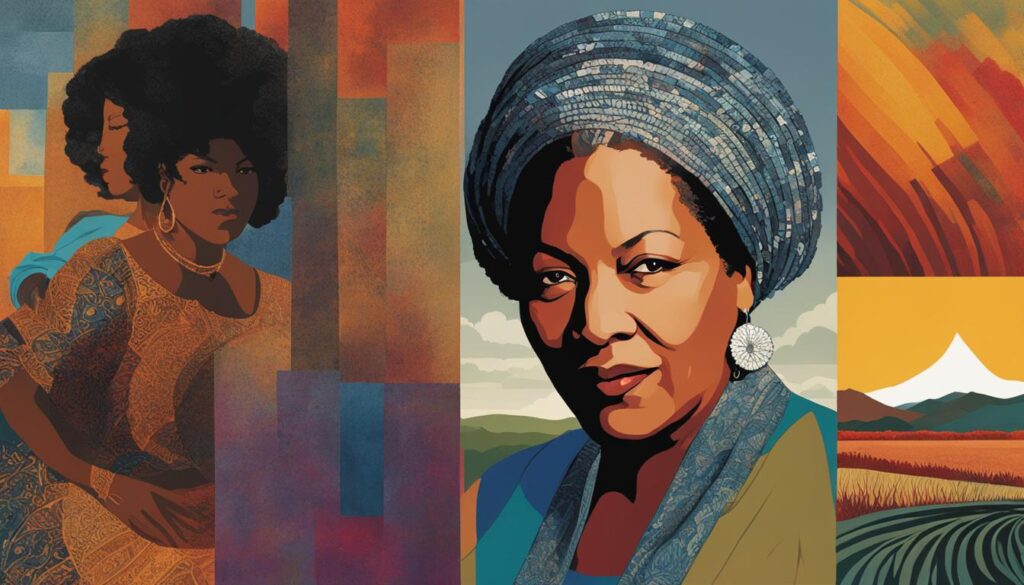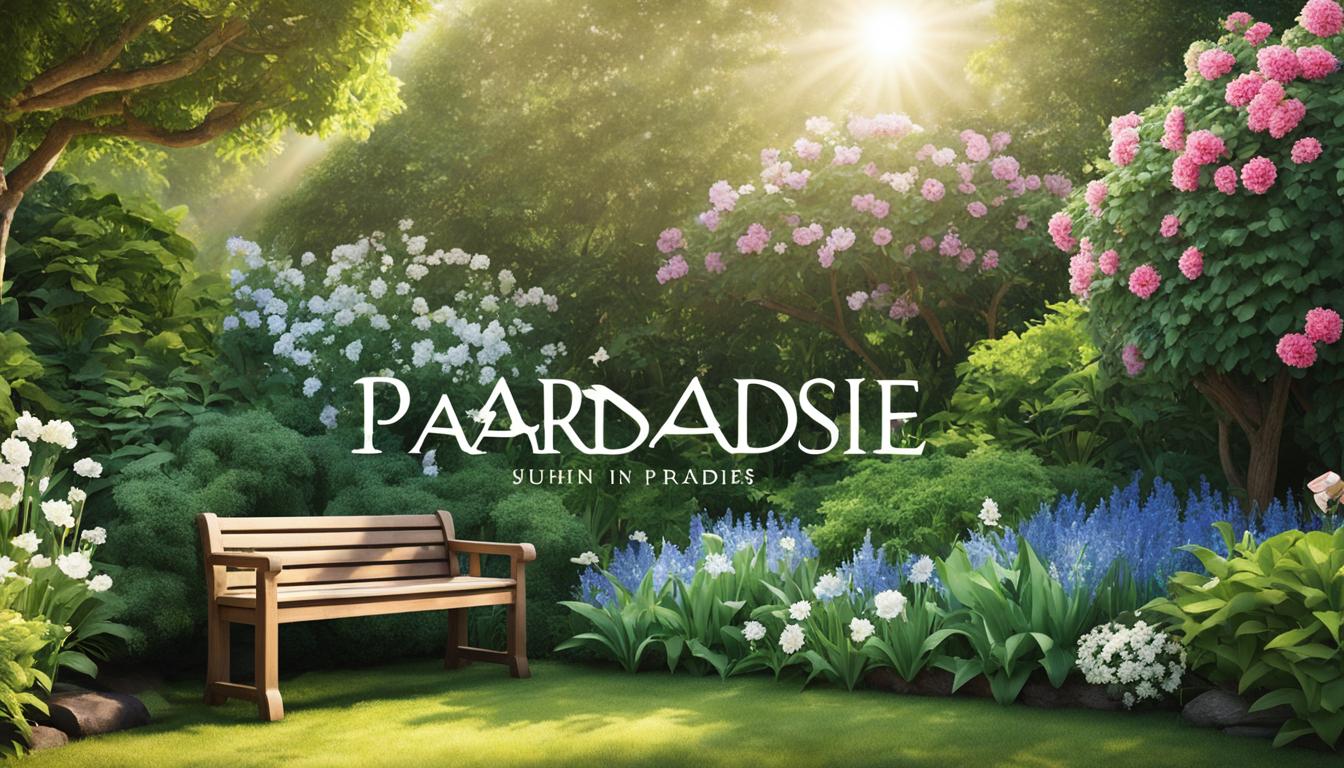If you’re a literature lover and enjoy audiobooks as a medium, then “Paradise” audiobook should be on your radar. In this article, we will provide a detailed review of Toni Morrison’s masterpiece in the form of an audiobook. Throughout the review, we will explore the themes, character development, and production quality, providing an in-depth analysis of the audiobook’s merits and drawbacks. Whether you’re a die-hard fan of Toni Morrison’s writing or you’re new to her works, this audiobook review will provide you with a comprehensive understanding of the “Paradise” audiobook. Keep read on to learn more about this fascinating work.
Introduction to “Paradise” by Toni Morrison
“Paradise,” written by Nobel Prize-winning author Toni Morrison, was published in 1997. The novel is set in 1970s Oklahoma and centers around the town of Ruby, an all-black community that was formed by former slaves and their descendants.
Morrison’s intricate and mesmerizing writing style, influenced by folklore, mythology, and a deep understanding of African American history, has earned her worldwide acclaim among scholars and readers alike.
“Paradise” is the third novel in a trilogy that includes “Beloved” and “Jazz.” With “Paradise,” Morrison continues to explore the themes of race, identity, and community, while also delving into the notion of an idealized paradise and the dangers of pursuing such a utopia.
Overview of the Plot
In “Paradise,” Toni Morrison delivers a story that centers around the community of Ruby, Oklahoma, and the Convent, a nearby haven for women who have suffered from abuse and oppression. At the heart of the plot is the conflict between the townspeople of Ruby and the women of the Convent, as deeply ingrained prejudices and beliefs threaten to tear apart the fragile alliances that have been formed.
The story unfolds through the perspectives of various characters, each with their own personal histories and motivations. Among them are the men of Ruby, who feel threatened by the women’s autonomy and independence; the women of the Convent, who have sought refuge from the traumas of their pasts; and the young women of the town, caught in the middle of a clash between tradition and progress.
As tensions rise and violence looms, the characters are forced to confront their own prejudices and biases, and to reckon with the complex legacies of their shared history. Ultimately, the story of “Paradise” is a deeply human one, exploring themes of identity, community, and the search for meaning and belonging in a constantly changing world.
Themes Explored in “Paradise”
One of the most striking features of Toni Morrison’s “Paradise” is the range of powerful themes that are interwoven throughout the text. These themes provide a rich subtext that deepens the narrative and underscores the complexity of the characters and their experiences.
At the heart of the novel is the concept of “paradise” itself – an idealized state of being that is sought after by many of the characters. This ideal takes on different forms for each character, representing their deepest desires, hopes, and fears.
Another central theme is race, which is explored through the lens of the all-black town of Ruby and its relationship with the nearby Convent, a secluded haven for women seeking refuge from violence and oppression.
The novel also grapples with questions of identity and belonging, particularly as the characters struggle to reconcile their personal histories and experiences with the demands of the community and the expectations of others.
Throughout the book, Morrison investigates the nature of power and its abuses, as well as the importance of forgiveness, redemption, and the possibility of change.
The Pursuit of Paradise
“Paradise” explores the universal desire for a better life, for something more meaningful than the daily grind. For each of the inhabitants of Ruby, “paradise” represents something different, but at its core, it is a vision of a life without fear, pain, or suffering. This vision is ultimately elusive, however, and each character must confront the gap between what they want and what they can realistically achieve.
Race Relations
A major theme running through “Paradise” on an analytical level is that of race. Morrison examines the complex relationships between people of different races, as well as the internal dynamics among members of the black community. These issues come to a head in the tension between Ruby and the Convent, which serves as a metaphor for the broader social and historical factors that shape race relations in America.
Identity & Community
Throughout the novel, the question of identity is explored through the lens of the Ruby community and its members. The characters struggle to define themselves and their place in the world, balancing the demands of family, history, and community with their personal desires and ambitions. This theme is particularly evident in the contrasting portraits of the women who live in the Convent versus those who reside in Ruby.
The pursuit of personal identity is woven together with that of community. The novel presents the idea that belonging to a community can be a source of strength, but it can also be a burden, particularly if that community is defined by exclusion and intolerance.
Through the lens of these themes, Morrison creates a powerful and thought-provoking exploration of the human experience, one that continues to resonate with readers to this day.
Character Analysis
In “Paradise,” Toni Morrison masterfully creates a cast of complex characters, each with their own unique motivations, strengths, and flaws. Over the course of the novel, these characters undergo significant growth and change, ultimately contributing to the overarching themes of the story.
One of the most prominent characters in “Paradise” is Ruby, a woman with a traumatic past who struggles with self-identity, love, and finding her place in a community that often rejects her. As the story progresses, Ruby’s character develops in fascinating ways, as she begins to confront her past and reclaim her own sense of self-worth.
Another significant character is Patricia, a white academic who has come to the all-black town of Ruby to enact a mysterious plan. Throughout the novel, Patricia’s motivations and loyalties are called into question, as readers are challenged to uncover the truth behind her presence in Ruby.
There are many other notable characters in “Paradise,” each contributing their own distinct voice and perspective to the story. From Connie, the pragmatic businesswoman, to Lone, the enigmatic preacher, each character brings their own unique experiences and struggles to the narrative.
Character Significance
Through her characterization in “Paradise,” Toni Morrison explores important themes of race, identity, and community. Each character represents a unique perspective on these issues, and their growth and development throughout the novel underscores the importance of self-discovery and individualism, even within a communal context.
| Character | Motivations | Significance |
|---|---|---|
| Ruby | Self-identity, love, acceptance | Represents the struggle for self-acceptance and understanding in the face of societal rejection and trauma. |
| Patricia | Mission, curiosity, power | Challenges readers to consider the ethics of outsider intervention and invites critical reflection on the role of race in identity formation. |
| Connie | Pragmatism, business savvy | Represents the realities of capitalism and the role of Black entrepreneurship in post-Civil Rights America. |
| Lone | Faith, leadership, mystery | Offers a unique perspective on the role of religion in the Black community and invites readers to reflect on the power of charismatic leadership in political movements. |
Overall, the characters of “Paradise” are richly crafted and thoughtfully considered, contributing to the novel’s lasting impact and significance in contemporary literature.
Writing Style and Language
Toni Morrison’s writing style in “Paradise” is strikingly distinctive, as she employs a rich and lyrical language that draws readers deeply into the story. Morrison often uses metaphorical language and vivid imagery, creating a powerful sensory experience as readers delve into the lives of the characters.
The use of multiple narratives, a hallmark of Morrison’s works, enables readers to experience the story from various perspectives with shifts in language style, tone, and voice. It adds further depth and complexity, especially in the passages where the different narratives converge.
Morrison paints vivid scenes that transport the reader into the world of Ruby, creating a clear sense of place and atmosphere. The descriptive language used paints a picture, and the readers come to know the characters and their community intimately, rising to an unflinching examination of human nature.
The language in “Paradise” can be challenging, throwing readers right into the middle of the story with minimal context, but this narrative technique adds depth to the novel. It requires the reader to develop a deeper understanding of the events, characters, and setting, leading to greater immersion in the world Morrison created.
The Use of Symbolism
| Symbol | Meaning |
|---|---|
| Convent | Sanctuary from a male-dominated world |
| Peacock | Vanity, pride, and immortality |
| White Horse | Purity, grace, and innocence |
Overall, Morrison’s writing style and language in “Paradise” have both a powerful impact on readers and an emotional depth that is rare in literature. She masterfully weaves intricate narratives and vibrant language to create a rich and engaging novel that touches readers on both an intellectual and emotional level.
Audiobook Narration
One of the primary benefits of experiencing “Paradise” as an audiobook is the exceptional narration. The voice actors, led by the talented Tonya Jordan, bring a level of emotional depth and authenticity to the characters that is sure to captivate listeners. Jordan’s rich, velvety voice is perfect for capturing Morrison’s prose, highlighting the beauty of her language and enhancing the reading experience.
The audio format also allows for a greater sense of immersion and engagement with the story. The careful attention to pacing, tone, and inflection draws listeners in and ensures that they remain invested from start to finish. The audiobook’s production quality is impeccable, ensuring a seamless and enjoyable listening experience.
Voice Actors
| Character | Voice Actor |
|---|---|
| Connie | Tonya Jordan |
| Seneca | Neal Ghant |
| Arnette | Micah Stampley |
| Pearl | Vanessa Williams |
| Lone | Dion Graham |
Overall, the “Paradise” audiobook offers a truly exceptional listening experience that brings the richness and complexity of Morrison’s work to life. Whether you’re a long-time fan of the author or new to her writing, this audiobook is sure to delight and move you.

Impact and Reception
“Paradise” has garnered critical acclaim since its release, earning widespread recognition for its exploration of complex themes and engrossing storytelling. Toni Morrison’s legacy as a literary giant is further reinforced by this work, which highlights her unique ability to weave together history, culture, and humanity into a captivating narrative.
The book’s reception among readers has been similarly positive, with many praising its thought-provoking commentary on race, community, and identity. “Paradise” has become a staple in many literature courses and book clubs, cementing its place as a modern classic.
| Year | Award | Book |
|---|---|---|
| 1988 | Pulitzer Prize for Fiction | “Beloved” |
| 1993 | Nobel Prize in Literature | N/A |
| 1998 | Howell’s Distinguished Fiction Award | “Paradise” |
| 2005 | National Book Critics Circle Award | “A Mercy” |
The above table showcases Toni Morrison’s numerous awards for her contributions to fiction. It highlights the literary community’s recognition of her work and the undeniable impact she has had on the genre. “Paradise,” in particular, has been highly regarded, earning the Howell’s Distinguished Fiction Award in 1998.
Reception among Critics
“Paradise” has also received critical acclaim, with many literary critics praising its themes, characters, and storytelling. Writing for The New York Times, Michiko Kakutani describes the book as “brilliantly imagined and realized.” She praises Morrison’s ability to create “vivid, impassioned characters” and her willingness to tackle complex themes with grace and depth.
Anthony Appiah of The Guardian echoes Kakutani’s endorsement, calling “Paradise” a “difficult and challenging masterpiece.” He praises Morrison’s exploration of “the conflicting desires for social order and individual freedom” and notes that the book’s complex narrative structure amplifies its impact.
Overall, “Paradise” can be considered a triumph of modern literature, showcasing Toni Morrison’s immense talent and highlighting her contributions to the literary canon.
Analysis of Morrison’s Themes
As one of the most celebrated authors of the 20th century, Toni Morrison has created a vast body of work that explores complex themes related to race, identity, and belonging. In “Paradise,” Morrison continues this tradition, delving into themes such as the pursuit of an idealized paradise, the importance of community, and the struggle to reconcile with the past.
One of the central themes in “Paradise” is the exploration of what it means to pursue a paradise. Morrison suggests that seeking perfection can be a dangerous endeavor, leading to exclusion and the demonization of those who do not fit within the idealized vision. The Convent, the all-female refuge in “Paradise,” is an example of this idealization gone awry, where the strict adherence to rules and the exclusion of outsiders leads to self-destruction.
The significance of community is another prominent theme in “Paradise.” Morrison suggests that the formation of bonds between individuals is essential for the survival and prosperity of a group, but that the bonds themselves can become sources of oppression and division if not approached with intention and care. The townspeople of Ruby, the community near the Convent, are an example of this tension, as they struggle with their own internal divisions and conflicts.
Finally, the theme of reconciling with the past is central to “Paradise.” Morrison emphasizes the importance of acknowledging historical traumas, such as slavery and racism, in order to move towards a more just and equitable future. The characters in “Paradise” grapple with their own difficult histories and experiences, highlighting the psychological toll of intergenerational trauma.
Themes Explored in “Paradise”
| Themes | Description |
|---|---|
| The pursuit of an idealized paradise | Morrison suggests that perfection can lead to exclusion and self-destruction |
| The importance of community | The formation of bonds is essential for survival but can become sources of oppression |
| Reconciling with the past | Morrison highlights the importance of acknowledging historical traumas to move towards a more just future |
In “Paradise,” Morrison explores these themes with nuance and depth, highlighting their historical and societal relevance to create a powerful work of literature that resonates with readers to this day.
Critical Perspectives on “Paradise”
“Paradise” has received both critical acclaim and criticism since its publication in 1997. Some critics have lauded the book for its poetic language, complex themes, and intricate storytelling. Others, however, have criticized it for being overly dense, convoluted, and difficult to follow at times.
While some readers and critics have found “Paradise” to be a profound exploration of race, gender, and power dynamics, others have criticized its portrayal of certain characters and themes. Some have argued that the book’s treatment of feminist and religious ideologies is underdeveloped, while others have praised its nuanced representation of the legacy of slavery and its effects on Black communities.
Notable “Paradise” Reviews and Criticisms
| Publication | Reviewer | Review Excerpt |
|---|---|---|
| New York Times | Michiko Kakutani | “‘Paradise’ represents a quantum leap forward in Toni Morrison’s evolution as a writer and confirms her standing as one of the few great artists of our time.” |
| Washington Post | Joyce Carol Oates | “In the intricacy of its design and the astonishing control of its language, ‘Paradise’ stands, I believe, with ‘Beloved’ as a pinnacle of Morrison’s art.” |
| The Atlantic | Verlyn Klinkenborg | “The first hundred or so pages of ‘Paradise’ constitute some of the most difficult reading I’ve ever encountered. But once the mosaic starts to take shape, it is nearly impossible to stop reading.” |
| Los Angeles Times | Jeffrey Eugenides | “Despite its vast canvas, ‘Paradise’ feels both small and narrow. In trying to avoid the problem of the Great American Novel, Toni Morrison has turned for solace to the arms of soap opera.” |
Overall, “Paradise” remains a complex and multifaceted work, inspiring a wide range of opinions and interpretations. Its enduring legacy in the literary canon is a testament to Morrison’s storytelling prowess and her ability to craft a thought-provoking narrative that continues to resonate with readers today.
Historical Context
In order to fully appreciate Toni Morrison’s “Paradise,” it is important to consider the historical context in which the story is set. The novel takes place in the mid-1970s, a time of social and political upheaval in the United States.
At this point in history, the Civil Rights Movement had achieved some major victories, such as the passing of the Voting Rights Act of 1965, but racial tensions and inequalities still persisted.
Additionally, the 1970s were characterized by a rise in feminist activism and awareness, reflected in the women’s liberation movement and the increased attention paid to issues such as reproductive rights and workplace discrimination.
The setting of “Paradise” in a fictional all-black town in Oklahoma allows for Morrison to explore these historical issues in a unique and nuanced way, touching on topics such as gender roles, religion, and the lingering effects of segregation and discrimination.
Cultural References
| Event/Person | Description |
|---|---|
| The Civil Rights Movement | A social movement in the United States during the late 1950s and early 1960s, which advocated for the full legal equality of African Americans and the end of racial segregation and discrimination. |
| The Women’s Liberation Movement | A feminist movement that emerged in the 1960s and 70s, advocating for women’s rights, including the right to vote, access to education and employment, and reproductive freedom. |
| Segregation | A legal and social system of discrimination and separation by race, which was enforced in the United States until the mid-1960s. |
| Religious Fundamentalism | A movement in which strict adherence to religious principles and beliefs is seen as essential to achieving salvation or social order. In “Paradise,” religious fundamentalism is explored through the character of Reverend Misner and his followers. |
Morrison’s novel addresses these historical events and issues with depth and nuance, highlighting both their immediate impact and their lasting legacy in American society. This attention to historical context adds richness and complexity to an already powerful and thought-provoking narrative.
Impact on Readers
As with many of Toni Morrison’s works, “Paradise” has had a profound impact on readers and has become a beloved classic over the years. Many readers have praised the book for its examination of themes that are still relevant today, such as race and identity. Morrison’s skillful writing and nuanced portrayal of complex characters have also drawn readers in, engrossing them in the narrative and compelling them to keep turning the pages.
The book’s exploration of the concept of paradise and its elusive nature has also resonated with readers, leading to deep reflections and personal insights. “Paradise” has been described as a rich and multilayered work that leaves a lasting impression on its readers.
Personal Reflections
Many readers have been moved and inspired by “Paradise,” sharing personal reflections and reactions to the book. Some have identified with the characters and their struggles, while others have appreciated the book’s exploration of complex themes and its impact on their worldview.
“Paradise” has been praised for its ability to evoke emotion and provoke thought, leading readers to question their own beliefs and perspectives. The book’s impact has been widely felt, making it a true masterpiece of literature.
Comparative Analysis
In comparison to Morrison’s other works, such as “Beloved” and “Song of Solomon,” “Paradise” has a quieter and more contemplative tone. While both “Beloved” and “Song of Solomon” are more focused on the individual struggles and experiences of their protagonists, “Paradise” is more concerned with the collective experiences and histories of a community.
However, like Morrison’s other works, “Paradise” grapples with complex and universal themes such as race, identity, and the search for meaning. Morrison’s writing is known for its poetic and lyrical quality, and “Paradise” is no exception, with vivid descriptions that illuminate both the physical and emotional landscapes of the story.
Compared to similar novels such as Zora Neale Hurston’s “Their Eyes Were Watching God” and James Baldwin’s “Go Tell It on the Mountain,” “Paradise” stands out for its more experimental narrative structure and its portrayal of a utopian community founded by African American women. While all three novels explore similar themes of race and identity, “Paradise” takes a more nuanced and complex approach, offering a more layered and multi-dimensional portrayal of the human experience.
Overall, “Paradise” showcases Morrison’s unique style and voice while exploring deeply resonant themes, making it a standout work both within her oeuvre and within the larger literary canon.

Production Quality of the Audiobook
When it comes to the “Paradise” audiobook production, the sound design is top-notch, immersing listeners in the story’s world. The audio clarity is excellent, with no background noise or distracting elements, making it easy to follow the narration. Additionally, the audiobook features a talented voice cast that brings the characters to life, including Tonya Jordan as the narrator and a full cast of performers for the various characters.
Moreover, the audiobook includes special features, such as “A Conversation with Toni Morrison,” where Morrison discusses the process of writing “Paradise” and her overall career. Another unique feature is the audio recording of the author reading a portion of the book, offering listeners a chance to hear the story in Morrison’s own voice.
Audiobook Production Quality
| Factors | Quality |
|---|---|
| Sound Design | Top-Notch |
| Audio Clarity | Excellent |
| Voice Cast | Talented |
| Special Features | Fascinating |
In conclusion, the “Paradise” audiobook production quality is exceptional, offering a seamless listening experience. The sound design, audio clarity, and talented voice cast bring the story to life, while the special features add an extra layer of depth to the overall experience. We highly recommend the audiobook to both fans of Toni Morrison’s work and those new to her writing.
Recommendations and Final Thoughts
After exploring the “Paradise” audiobook, we highly recommend it to both fans of Toni Morrison’s work and those who enjoy artful storytelling. The narration quality is superb, taking listeners on an emotional journey full of vivid descriptions and well-crafted dialogue.
The audiobook format adds an extra layer of depth to the already-compelling story, making it a must-listen experience for anyone seeking engrossing literary works.
Overall, “Paradise” is a stunning novel and an exceptional audiobook adaptation that should not be missed.
Audiobook Details:
| Narrated by: | Toni Morrison |
|---|---|
| Length: | 12 hours and 10 minutes |
| Publisher: | Random House Audio |
Whether you’re a longtime fan of Morrison’s work or new to her writings, the “Paradise” audiobook is a must-listen experience that is sure to captivate and inspire you.
Conclusion
In conclusion, the “Paradise” audiobook is a masterful adaptation of Toni Morrison’s powerful novel. The rich themes explored throughout the story, combined with Morrison’s unique writing style and the exceptional narration of the voice actors, make for a captivating and immersive listening experience.
This audiobook is highly recommended for fans of Morrison’s work, as well as anyone looking to explore complex themes of race, identity, and community within a rich and intricate narrative. The impact of “Paradise” is felt not only in its critical reception but in the profound effect it has had on readers and its enduring legacy within the literary community.
Overall, “Paradise” is a must-read (or must-listen) for anyone interested in exploring the human experience in all its complexity and nuance. It is a remarkable achievement from one of the greatest writers of our time.



